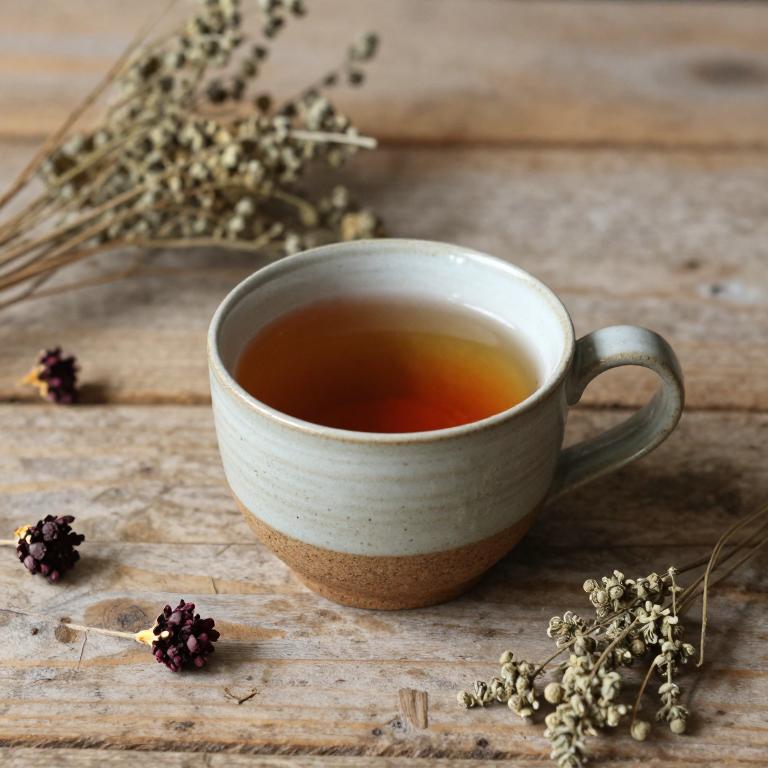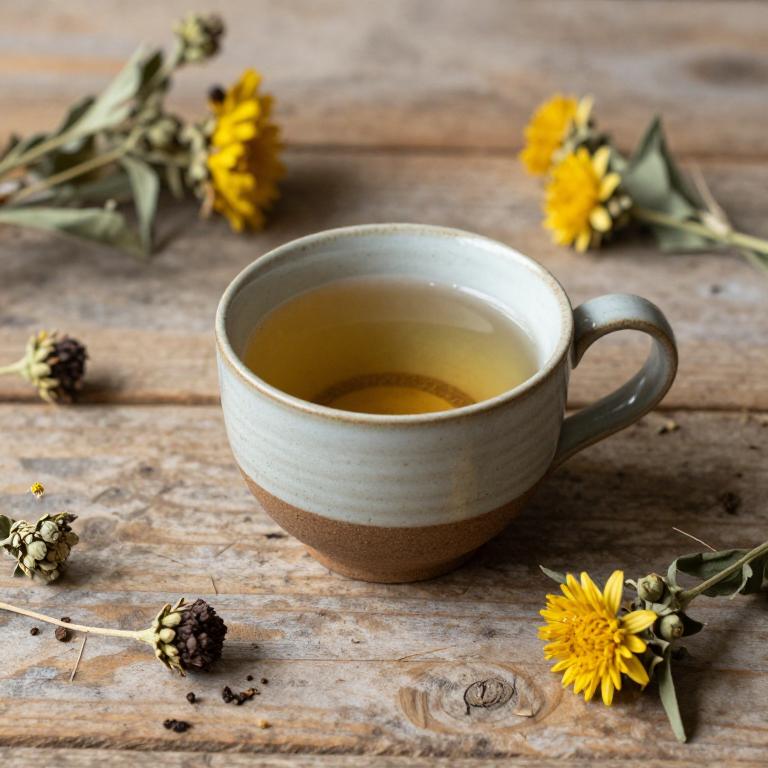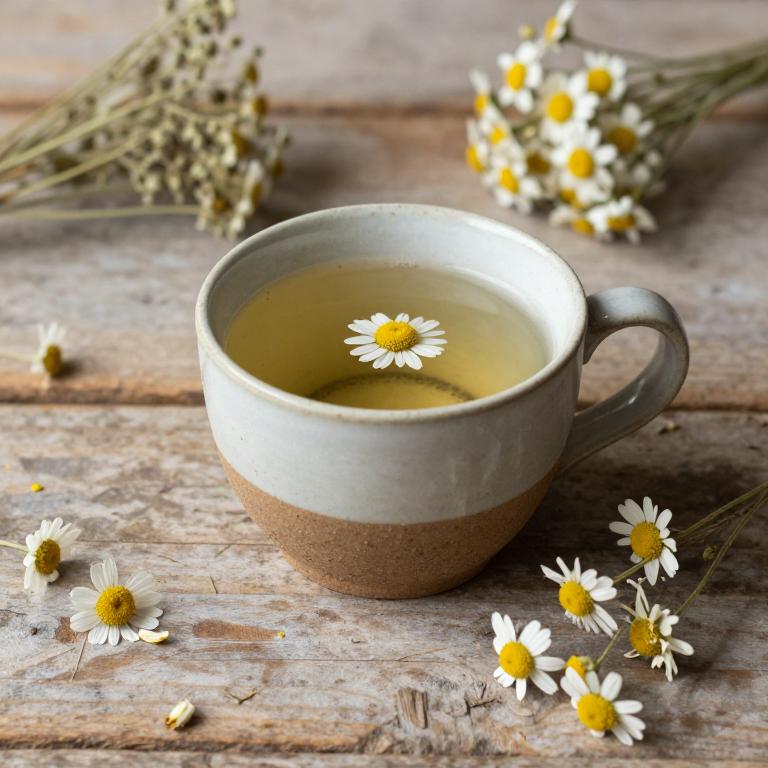10 Best Herbal Teas For Period Cramps

Herbal teas are a natural and soothing remedy for alleviating period cramps, offering a gentle alternative to over-the-counter medications.
Commonly used herbs such as ginger, chamomile, peppermint, and raspberry leaf are known for their anti-inflammatory and muscle-relaxing properties. These teas can help reduce pain, ease bloating, and promote overall menstrual comfort by calming the uterine muscles. Drinking a warm cup of herbal tea during menstruation can also provide a calming effect, helping to reduce stress and anxiety associated with cramps.
For best results, it is recommended to consume these teas regularly during the menstrual cycle or as needed for relief.
Table of Contents
- 1. Chaste tree (Vitex agnus-castus)
- 2. Fennel (Foeniculum vulgare)
- 3. Black cohosh (Cimicifuga racemosa)
- 4. Stinging nettle (Urtica dioica)
- 5. Dog rose (Rosa canina)
- 6. Turmeric (Curcuma longa)
- 7. Heartworts (Leonurus cardiaca)
- 8. German chamomile (Chamomilla recutita)
- 9. English lavender (Lavandula angustifolia)
- 10. Ginger (Zingiber officinale)
1. Chaste tree (Vitex agnus-castus)

Vitex agnus-castus, commonly known as chaste tree or vervain, is a herbal remedy often used to support hormonal balance and alleviate symptoms associated with menstrual cycles.
Herbal teas made from vitex are believed to help regulate menstrual flow and reduce cramping by influencing the production of luteinizing hormone and prolactin in the body. Many women find relief from period cramps by incorporating vitex into their daily herbal tea routine, especially during the days leading up to their menstrual period. While it is generally considered safe for most adults, it is advisable to consult a healthcare provider before use, particularly for those with hormonal disorders or who are pregnant.
Overall, vitex agnus-castus herbal tea offers a natural approach to managing period discomfort and supporting reproductive health.
2. Fennel (Foeniculum vulgare)

Foeniculum vulgare, commonly known as fennel, is a popular herbal tea used to alleviate period cramps due to its mild antispasmodic and anti-inflammatory properties.
The tea is often consumed during menstruation to help ease the discomfort of cramping and reduce bloating. Fennel contains compounds like anethole, which may help relax the uterine muscles and improve blood flow. It is generally considered safe for most women when consumed in moderate amounts, though it should be avoided in large quantities or during pregnancy.
Many women find that drinking fennel tea regularly can provide natural relief from menstrual pain without the need for pharmaceutical interventions.
3. Black cohosh (Cimicifuga racemosa)

Cimicifuga racemosa, commonly known as black cohosh, is a traditional herbal remedy often used to alleviate symptoms of menstrual cramps and menstrual pain.
It is believed to work by influencing hormone levels and reducing uterine contractions, which can help ease the discomfort associated with menstruation. Herbal teas made from the root of Cimicifuga racemosa are typically prepared by steeping the dried root in hot water, resulting in a soothing and aromatic beverage. These teas are often recommended for women experiencing dysmenorrhea, though they should be used under the guidance of a healthcare professional.
While some studies suggest potential benefits, more research is needed to fully understand its efficacy and safety for long-term use.
4. Stinging nettle (Urtica dioica)

Urtica dioica, commonly known as stinging nettle, is a herbal remedy that has been traditionally used to alleviate symptoms such as period cramps.
When brewed into a tea, it is believed to help reduce inflammation and ease menstrual discomfort due to its high content of minerals like iron and silica. The tea may also support hormonal balance, which can contribute to less severe cramping during menstruation. However, it is important to consult with a healthcare provider before using stinging nettle tea, especially for those with existing health conditions or who are pregnant.
While some studies suggest potential benefits, more research is needed to fully understand its efficacy and safety for menstrual pain relief.
5. Dog rose (Rosa canina)

Rosa canina, also known as rosehip, is a popular herbal tea used to alleviate period cramps due to its rich content of antioxidants, vitamins, and anti-inflammatory properties.
The tea is made from the dried fruit of the Rosa canina plant, which has been traditionally used in herbal medicine for its soothing effects on the body. Regular consumption of rosehip tea may help reduce menstrual pain by improving circulation and reducing inflammation in the uterine lining. Its high levels of vitamin C and bioflavonoids contribute to its ability to support overall health and ease discomfort during menstruation.
Many women find that incorporating rosehip tea into their routine provides natural relief from cramps without the side effects of pharmaceutical pain relievers.
6. Turmeric (Curcuma longa)

Curcuma longa, commonly known as turmeric, is a popular herb used in herbal teas to help alleviate period cramps due to its anti-inflammatory and analgesic properties.
The active compound in turmeric, curcumin, has been shown to reduce pain and inflammation associated with menstrual discomfort. When brewed into a tea, turmeric can be easily absorbed by the body and may provide natural relief without the side effects of over-the-counter pain medications. Many women find that drinking turmeric tea regularly during their menstrual cycle helps ease cramps and improve overall menstrual comfort.
However, it is advisable to consult with a healthcare provider before incorporating turmeric into your diet, especially if you have existing health conditions or are taking other medications.
7. Heartworts (Leonurus cardiaca)

Leonurus cardiaca, commonly known as heartwarming or redweed, has been traditionally used in herbal medicine to alleviate period cramps due to its antispasmodic and anti-inflammatory properties.
When brewed into a herbal tea, it can help relax uterine muscles and reduce the intensity of menstrual pain. The tea is often prepared by steeping dried leaves in hot water for several minutes, allowing the active compounds to infuse into the liquid. Many women find relief from cramps after regular consumption of this calming herbal remedy.
However, it is advisable to consult a healthcare provider before using Leonurus cardiaca, especially if you have existing medical conditions or are taking other medications.
8. German chamomile (Chamomilla recutita)

Chamomilla recutita, commonly known as German chamomile, is a popular herbal remedy used to alleviate period cramps due to its mild sedative and anti-inflammatory properties.
This herbal tea is often consumed as a warm beverage to help relax the uterine muscles and reduce menstrual discomfort. It contains compounds such as apigenin, which may help ease pain and promote a sense of calm during menstruation. Many women find that drinking chamomile tea regularly during their cycle can provide natural relief without the side effects of over-the-counter pain medications.
However, it is advisable to consult with a healthcare provider before using chamomile, especially if you have allergies or are pregnant.
9. English lavender (Lavandula angustifolia)

Lavandula angustifolia, commonly known as English lavender, is often used in herbal teas to help alleviate period cramps due to its calming and anti-inflammatory properties.
The essential oils in lavender, particularly linalool and lavandulyl acetate, are believed to help reduce uterine spasms and ease menstrual discomfort. When brewed into a tea, lavender can promote relaxation and ease the tension that often accompanies menstrual pain. Many women find that drinking lavender tea regularly during their menstrual cycle can provide a gentle, natural remedy for cramps without the side effects of pharmaceuticals.
However, it is advisable to consult with a healthcare provider before using lavender tea, especially for those with existing health conditions or who are pregnant.
10. Ginger (Zingiber officinale)

Zingiber officinale, commonly known as ginger, is widely used in herbal teas to alleviate symptoms of period cramps due to its anti-inflammatory and analgesic properties.
The active compounds in ginger, such as gingerol and shogaol, help reduce uterine contractions and ease pain associated with menstruation. Drinking ginger tea regularly during the menstrual cycle can provide natural relief without the side effects of over-the-counter pain medications. It is often recommended to consume ginger tea in warm form to maximize its soothing effects on the digestive and reproductive systems.
However, it is important to consult a healthcare provider before using ginger tea, especially for individuals with gastrointestinal issues or those taking blood-thinning medications.